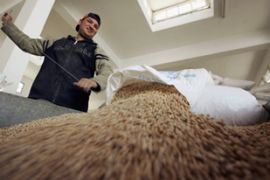Hopes rise amid Gaza truce
Palestinians cautiously expectant of Israel easing blockade following ceasefire.

Israel has reportedly agreed to allow, starting from Sunday, the entry of limited quantities of flour, sugar and vegetable oil through the strip’s sealed borders.
Crippling shortages
But on Saturday, Gaza continued to reel under widespread fuel shortages and price rises, spawned by the Israeli blockade.
In the dusty border town of Rafah, black market petrol smuggled through tunnels from Egypt was still selling for the same price it did before the truce – around $7 per litre.
|
“If you think the Jews are going to open the border to let petrol in you are dreaming,” Abu Mohammed, a Palestinian in Gaza |
“If you think the Jews are going to open the border to let petrol in you are dreaming,” Abu Mohammed said as his sons sucked fuel from a plastic tank to siphon it into used soft drink bottles in the heart of a crowded market.
Hamas has said smuggling will continue, and the streets of Rafah were lined with tables of cheap Chinese goods brought in through the tunnels, which Israel says are also used for smuggling arms.
Rafah merchants said as long as the blockade continued, the network of tunnels between Egypt and Gaza would remain the territory’s lifeline.
“We are poor and we need the tunnels to live. How can Hamas prevent us from earning a livelihood?” a 37-year-old merchant, who gave his name only as Nabil, said.
Like many others, he was trying to sell goods – in his case a motorbike – bought in Egypt in January after Palestinians temporarily blew open the border fence.
Mark Regev, an Israeli government spokesman, said on Friday that the Egyptian-brokered truce explicitly stated that arms smuggling must halt and that Hamas was “seeking to weaken the peace” by claiming otherwise.
Exchange snag
Across the border, Israelis living along the Gaza frontier hoped for an end to the near-daily rocket and mortar attacks that have killed four people since January.
Both Hamas and Israel have vowed to respect the truce, but Israel has made it clear the armed forces are prepared to act should the ceasefire fail.
Many Israelis were disappointed that the ceasefire did not involve the release of Israeli soldier, Gilad Shalit, captured by Palestinians in a cross border raid in June 2006.
London-based newspaper al-Sharq al-Awsat on Saturday reported that the release of Shalit is being delayed by a dispute over whether to free 30 Hamas prisoners, accused by Israel of involvement in deadly attacks against its citizens.
The agreement between Israel and Hamas stipulates that 450 Palestinian prisoners will be freed in exchange for Shalit.
Although the calm has held for more than two days the border remains tense.
Siham Smeri, a Palestinian farmer and mother of five, says the Israelis still fire warning shots when the farmers get too close to the fence. Her family owns land near the border that they haven’t farmed in more than two years.
“The first day of the truce we went to a hill near the border. An Arab Israeli soldier yelled out to us: ‘Get away from here or we will shoot you and break the truce’.” They have not been back since.